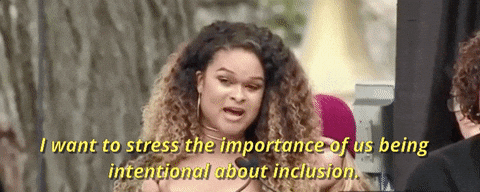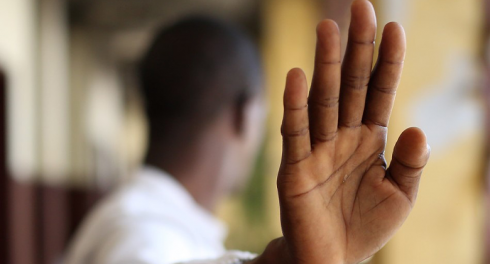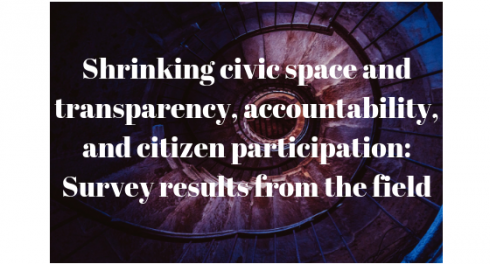Highlights
- Building back different?
- Digital damage control
- Immuno deficiencies (TPA style)
- Electoral rumblings
- Conflicting demands
- Trust issues
- TAI Spotlight
Building back different?

Image Credit: Bretton Woods Project
Carnegie’s Civic Research Network reveals how civil society has adapted to the pandemic by growing self-help activism, rethinking economic models, and revitalizing democratic politics.
Tom Gerald Daly also urges the creation of a “better civic space.” He finds welcome signs of civil society resilience, innovation, and defiance during the pandemic even if the bigger picture is bleaker – “Regression in political freedoms during the pandemic has been most acute in undemocratic hybrid and authoritarian states.”
Turning to one country context, a year after the #EndSARS movement, Matthew T. Page reveals how Nigeria’s top powerbrokers have cultivated a new generation of pro-government NGOs whose activities are impacting democracy, adding that such groups “undermine public trust in the country’s many nongovernmental organizations working to promote good governance and human rights (and) this operating model also constitutes a global threat to democracy, not only in developing democracies.”
Digital damage control
Talking of harms, Veronica Arroyo and Donna Wentworth argue it is past time the World Bank recognize the risks of the digital id systems it promotes, looking at what is unfolding in Afghanistan.
Staying on the tech track, Anjana Ahuja argues that a global AI bill of rights is urgently needed, while Etalab lays out what governments can do right now to strengthen algorithmic accountability, drawing on France’s experience.
Is transparency a growing tool in great power rivalries? Some signs on multiple fronts. Huawei considers transparency as a tactic in its emergence from under the shadow of the case against its CFO. China prepares to test thousands of blood bank samples from the city of Wuhan as part of a probe for more transparency re origins of Covid-19 and is under pressure to be transparent in its handling of the Evergrande default.
Essential Listening I: Don’t miss these 10 anti-corruption podcasts
Checkout CIPE Anti-Corruption & Governance Center’s list of ten unmissable anti-corruption podcasts! Also, watch out for their competition which will determine their readers’ choice for the best anti-corruption podcast of the year.
Immuno deficiencies (TPA style)
The Bureau of Investigative Journalism offers a fascinating insight into how COVAX failed on its promise to vaccinate the world. Were any governance experts involved in the design? We suspect not. Perhaps part of the problem.
Meantime, Human Rights Watch reveals how a lack of transparency and accountability impeded the flow of resources to those most in need during the pandemic. Not that the problems started with COVID-porous revenue collection systems, global financial secrecy jurisdictions contributed to capital flight from poorer nations as revealed all too well in the Pandora Papers, but Chris Ogunmodede argues that debates over the legalities of offshore tax havens are a red herring distracting from the real problems.
Electoral rumblings

Katharina Pistor considers the democratic implications of the latest revelations into the old ways the rich hide their wealth.
Geoffrey York explains how polarized and divided parties have left South African politics in turmoil, with the country’s ruling party riddled with corruption scandals. Further north, the Czech Republic’s Andrej Babis and Austria’s Sebastian Kurz were both hit by such scandals and lost power on the same day. Could this herald “the collapse of a new narrative for conservative parties in Europe”?
Francesca worries about voting in a time of democratic erosion, while Richard Young finds signs of democratic renewal in Europe even in a seemingly illiberal age.
Essential Listening II: FinCrime Podcast

To all who love their crime thrillers fraudulent, corrupt, or just well-laundered, the third season shines a light on the dark world of financial crime as depicted in the movies and TV. Leading anti-financial crime professionals will be talking about a film or show that has inspired and informed them in their work.
Conflicting demands
As the Open Government Partnership enters its second decade and the Extractive Industries Transparency Initiative its third, Mark Robinson reflects on advances in open government and extractives transparency work and what’s next.
Talking of extractives, Jim Wormington looks at the future of Guinea’s mining sector and wonders if Guineans will finally benefit from the country’s mineral wealth. This, at a time when there is growing concern that locals don’t feel the benefits of African resource-for-infrastructure deals.
Lack of transparency is threatening to undermine Vietnam’s rubber industry as global buyers increasingly demand material that meets stringent ethical and legal standards. Next door, murky land concessions are fueling deforestation in Cambodia, as this data story reveals.
On the investment front, hedge fund manager Chris Hohn (and founder of Children’s Investment Fund Foundation) steps up his campaign to end bank lending for fossil fuels as many banks try to fall back on weaker 2050 goals. The Oak Foundation reports on successful work to build good governance of natural resources from a wildlife conservation starting point.
Trust issues

Funders can draw inspiration from these principles to support inclusive energy transition in the poorest countries, while Bryon Swift urges uptake of “trust-based” approaches in environmental grantmaking. That call will resonate with Shane Murphy Goldsmith, who calls on philanthropy to invest trust in grassroots organizations and funding capacity-building support to ensure successful implementation of policy rather than prematurely declaring victory.
Stuart Buck looks at the pros and cons of strategic philanthropy as Dana Doan argues that philanthropists must “ensure that their social impact measures and methods align with the values of community-led change.”
Read five guiding principles for telling intersectional stories that help people see the complex ways communities experience systems of inequality.
Finally, learn how the COVID-19 pandemic propelled an intermediary to take on running a pooled philanthropic fund, yielding lessons for first-time, pooled-fund managers.
Other Stories
- Behind the process: selecting OGP’s next civil society leaders
- An exploration of the association between fuel subsidies and fuel riot
- NYU Abu Dhabi launches MENA’s first Strategic Philanthropy Initiative
- When it comes to public finances, credibility is key
- To grow women’s rights globally, we must invest in women locally
- African Development Bank debars Sino-Kenya Engineering Group Company Limited and Mr. Yuehua Bai for 36 months for fraudulent practices
- India’s message to Asia – Unite against terrorism, reject connectivity projects that serve ‘another agenda
- New daily cargo ammonia assessments bring transparency to crucial market and emerging front-runner in energy transition
- China Uncovered: China’s Tech Giants
TAI Spotlight
Ford Foundation launches first-ever U.S. disability rights program as they welcome Catherine Chinedum Aniagolu-Okoye as their regional director for West Africa.
McArthur Foundation‘s Urmi Sengupta, Chris Jurgens (Omidyar Network), and Adam Connaker (The Rockefeller Foundation) wrote about the ambitions of the Catalytic Capital Consortium Grantmaking initiative.
Hewlett Foundation joins over twenty philanthropic organizations to commit over $223m to reduce methane emissions. Check out their feature on Gabriel Zucman on what this year’s global minimum tax proposal could mean for the global economy.
Luminate congratulates their long-time partner and friend Maria Ressa, on her Nobel Peace Prize win, stating its importance to democracy.
Job Listings
- Program officer on Money in Politics at Piper Fund – October 20, 2021
- Program Assistant at Counterpart International – Ongoing
- Director, Accountability at Human Rights First –November 18, 2021
- Program Officer on Governance at National Democratic Institute – Ongoing
- Temporary: Project Assistant with Democratic Governance Team at National Democratic Institute – Ongoing
- Jobs at I-APS – Ongoing
- Senior Advisor on Corruption and Illicit Finance (Myanmar) at The Sentry – Ongoing
- Strategic Partnerships Intern at The Fund for Global Human Rights – Ongoing
Jobs at TAI members
- Job postings at Hewlett Foundation – Ongoing
- Job postings at MacArthur Foundation – Ongoing
- Job postings at Open Society Foundations – Ongoing
- Job postings at Luminate – Ongoing
- Job postings at Ford Foundation– Ongoing
- Job postings at FCDO – Ongoing
Calls/Opportunities
- The Global Coaching Fellowship – October 25, 2021
- Participate: Short Film contest on Unveiling our stories: Victims of corruption – November 10, 2021
- Women’s leadership mentoring programme in Nepal – November 16, 2021
- Board of Trustee at Integrity Action – December 31, 2021
- West Africa Civil Society Institute (WACSI) call for papers and articles – Open year-round
- Free digital security training– Ongoing
- Call for proposals: Informality, tax, and the state – Proposals accepted on a rolling basis
Calendar
- Sustainable Territories and Participatory Democracy conference – October 20-22, 2021
- Mining and Climate Change: Preventing socio-environmental impacts in a fast-changing world – October 26, 2021 ((10:00 – 11:30 CEST)
- ASEAN Regional Dialogue on the role of public procurement in achieving the SDGs –October 27-28, 2021
- Webinar: Namibia_Natural Resources, Equitable Development & Corruption – October 27, 2021 (1:30 pm to 3:00 pm EST)
- Responding to African Priorities in U.S.-Africa Relations: Insights from Afrobarometer –October 28, 2021 (11:30 a.m. to 12:45 p.m. EDT)
- Global Investigative Journalism conference – November 3-5, 2021
- Exchange 2021: The Systems Summit – November 9-10, 2021
- National Tax Association conference – November 18-20, 2021
- The Summit for Democracy – December 9-10, 2021
- Open Government Partnership global summit – December 13-17, 2021
- International Convention on Anti-Corruption, Good Governance, and Human Rights – April 21-22, 2022 (Boston, MA)
Want to stay updated on happenings around the TPA sector, sign up for our newsletter here


